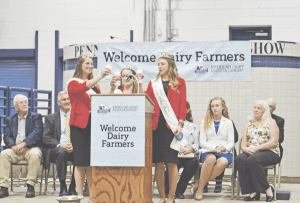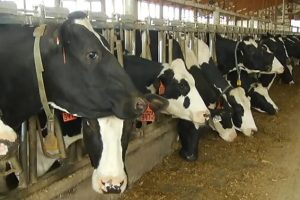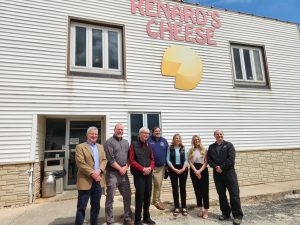
“They’re not only farmer-funded, they’re farmer directed,” said Weimer, “and done on behalf of all farmers who are working hard every day and contributing to programs.”
The ADA North East covers Pennsylvania, New York, Maryland, Delaware and New Jersey. “We focus our marketing strategies throughout this area where there are 50 million consumers,” said Weimer. “That’s a big opportunity for us. We focus our energy and attention toward initiatives that will have the biggest return across the board for all dairy farmers. We can’t do everything everywhere, but we need to have focus so we have strength and impact.”
Weimer said the strategy of the organization is centered on sales and trust. “It’s a well-established fact that consumers’ confidence and passion for dairy products leads to increased sales,” she said. “We target primarily the youth market and moms – the people who are making food-purchasing decisions and are in the movable middle. We direct our focus toward demographic groups that have the greatest potential to influence both current and future sales.”
Two key sales programs include retail and school sales. Weimer said more dairy products are sold in retail than anywhere else, so association work with retail chains helps bring more attention to real dairy products in the dairy aisle. Retailers can obtain customized signage, nutrition information and merchandising techniques.
“We also do audits in stores to make sure cases in stores are clean, cold and well-stocked,” said Weimer. “All these things add up to more dairy sales.” A farm-to-table program features photos of local dairy families in the dairy case to help consumers connect the product they’re buying with the farmers who produced it.
In schools, the strategy includes optimizing opportunities for dairy items on school menus and increasing participation in breakfast programs. “Higher breakfast participation means more milk will be sold,” said Weimer. “We help schools find solutions, more ways to bring dairy foods to the school menus, like yogurt and cheese, while still meeting nutrition guidelines of the National School Lunch Program.”
Weimer noted that current dietary guidelines allow 1% flavored milk to be served in schools. “By law, Dairy Checkoff cannot engage in that debate to change the law for higher fat milks to be available in schools,” she said. “However, if you can get that done and higher fat milk is approved for schools, we’ll promote it, then kids can have some of the extra benefit of better flavor that’s in higher fat milks.”
Research shows that 50% of American adults are willing to talk with a dairy farmer about their farming practices if given the opportunity. “We need to have those conversations,” said Weimer. “We need to develop confidence in the food supply and the people who provide it so we can continue to have people who want to purchase your product instead of questioning.”
Weimer mentioned various programs designed to help dairy farmers learn how effectively present information to consumers, including “Driving Dairy Discussions,” a workshop designed to help find common ground with consumers so they’re open to hearing dairy farmers’ stories. A new program features virtual farm tours that will allow educators to livestream a dairy farm host to the classroom. Specific programs are designed for age groups, allowing thousands of students to visit farms while making efficient use of dairy farmers’ time.
Millions of consumers can be reached through digital and social media strategies. “Digital communication allows us to target our audience better than we ever could before,” said Weimer. “A huge portion of consumers use social media for information, so by targeting those individuals based on demographics such as age, location, interests and other factors, we can better direct our messaging so it will resonate with different groups of people for what’s most important to them.” Weimer added that information dissemination is highly efficient and impactful in promoting dairy products.
Weimer said food service partnerships continue to be critical in promoting and selling more dairy products. “We have to think hard about relationships with companies like McDonald’s, Taco Bell, Pizza Hut and Domino’s,” she said. “These are national programs that have local impact – 36,000 fast food restaurants that are our partners are within the American Dairy Association North East region. Domino’s has increased its cheese use by 72% since we started this partnership with them.” Weimer added that Domino’s donated 100 pizzas for the youth opening ceremonies at the All-American Dairy Show.
ADA North East resources are available at www.americandairy.com.

























